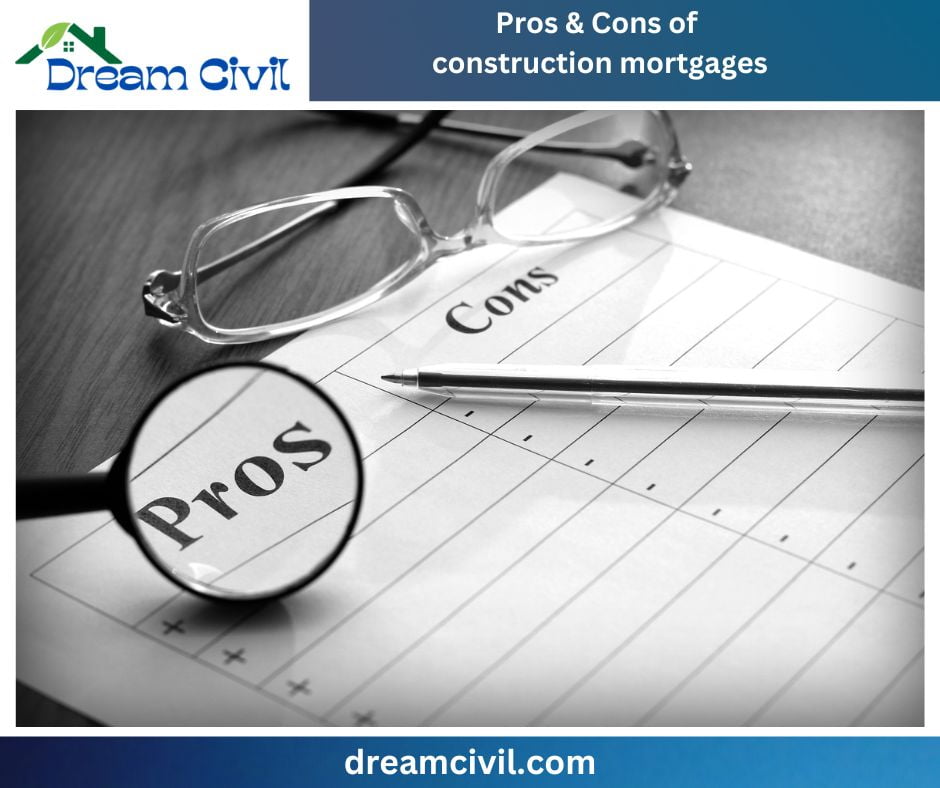Table of Contents
Do you know What are the pros and cons of construction mortgages? If not, this article could be the best choice to get complete information.
| Read More: 9 Effective Role of Civil Engineering in Public Health |
A. Summary:
✓ To summarize, construction mortgages are a great way to get financing customized to your building or renovation project.
✓ However, they can also be complicated and risky. Before deciding whether to use a construction mortgage, it’s essential to research and fully understand the terms, requirements, and potential challenges.
✓ You are speaking with a financial advisor or mortgage professional who can offer personalized guidance based on your unique situation.
✓ If you’re unsure whether a construction mortgage suits your project, a financial advisor can help you evaluate your financial circumstances and determine the best course of action.
B. What are Construction Mortgages?

✓ Construction mortgages are also known as construction loans and construction-to-permanent loans. These specialized loans are designed specifically for this purpose.
✓ Like any financial product, they have their various cons and pros. The main advantage of a construction mortgage is that it provides more flexibility than a traditional mortgage. You can draw money out as needed during the construction process.
C. What are the pros and cons of construction mortgages?
The pros of construction mortgages are as follows:
1. Customization: With a construction mortgage, you can construct your ideal home from scratch or modify an existing property to suit your preferences perfectly. The ability to tailor every detail to your liking is highly desirable.
2. Flexible Payments: In the construction phase, you usually only have to pay interest on the amount you have received instead of the entire loan amount. As a result, the initial payments are more affordable.
3. Draw Schedule: When it comes to construction mortgages, a draw schedule is typically involved. This means that funds are released gradually as the construction advances. This approach guarantees that enough funds will always be available when needed and reduces the accumulated interest.
4. Lower Initial Costs: When you don’t borrow the total loan amount, your initial interest payments may be less than a standard mortgage.
5. Increased Property Value: Building a new house or making substantial renovations can boost the value of your property, providing benefits for selling or refinancing.
6. Interest-only payments during construction: Pay interest only on what you withdraw to save on monthly payments.
7. Flexible terms: Unlike traditional mortgages, construction loans usually offer greater flexibility regarding repayment periods and loan-to-value ratios.
8. No down payment required: Some rare construction loans do not demand a down payment, which can create a more affordable way for first-time homebuyers.
The cons of construction mortgages are as follows:
1. Complex Approval Process: Obtaining a construction mortgage may require a more intricate approval procedure than regular mortgages. Lenders typically mandate comprehensive project plans, cost evaluations, and a robust credit record.
2. Higher Interest Rates: It’s common for construction loans to have higher interest rates than regular mortgages because they carry more risk. Construction loan interest rates are typically higher than those for traditional mortgages. This is because lenders view them as riskier, given the unpredictable nature of construction projects.
3. Shorter Terms: Construction mortgages usually have shorter terms than regular mortgages. Hence, after completing the construction, you will need to either refinance or obtain a new mortgage, which may lead to extra charges and possible variations in interest rates.
4. Risk of Cost Overruns: Construction projects have a reputation for exceeding the budget. In the event of unforeseen expenses during construction, you may have to pay for them out of your pocket if your loan does not cover them entirely.
5. Market Changes: Economic changes can impact the cost of construction materials and labor, which may affect your budget and timeline. Construction mortgages typically require a higher down payment than traditional ones, resulting in a substantial upfront cost.
6. Ownership Delay: Moving into a newly constructed home is impossible until the construction is finished, which may result in temporary lodging and possible disruptions.
7. Credit and Income Requirements: To be eligible for construction loans, borrowers usually need a good credit score and a consistent source of income. This can make it challenging for some individuals to obtain such loans.
8. Harder to qualify: In Construction mortgages, lenders require a higher credit score and additional documentation since it is more complex than traditional mortgages.
D. What are some extra things to be considered when choosing construction mortgages?
Some extra things to be considered when choosing construction mortgages are as follows:
1. The lender’s requirements: It is essential to fulfill the lender’s prerequisites for a construction loan. These criteria may comprise possessing a favorable credit score, providing a down payment, and demonstrating evidence of income.
2. The lender’s experience with construction loans: When looking for a lender for a construction loan, it’s essential to find one with experience with this type of loan. Additionally, you must provide evidence of your income to the lender.
3. The loan’s terms and conditions: Ensure you get the best possible terms and conditions by comparing different loan options. Make sure to carefully read the terms and conditions of each loan before making a decision.

